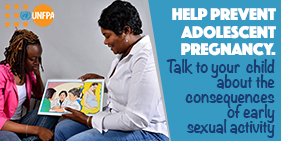
UNFPA Sub-regional Office for the Caribbean has embarked on a sexual and reproductive health information programme, to increase awareness about the health and development challenges posed by adolescent pregnancy, and provoke action to address the problem in the region.
Through the public education programme, UNFPA has sought to highlight elements of the Integrated Strategic Framework for the Reduction of Adolescent Pregnancy developed by the CARICOM Secretariat with support from UNFPA, which is designed to achieve a 20% reduction between 2014-2019.
It is estimated that about 20 per cent of women in the Caribbean have at least one child by the age of 19, with a considerable percentage of adolescent girls even giving birth before the age of 15 years.
A pregnancy during childhood jeopardizes the rights, health, education and potential of these adolescents, robbing them of a better future. According to recently published data by PAHO/WHO, deaths related to pregnancy and childbirth are among the leading cause of death for 15-19-year-old girls in the Latin America and the Caribbean (LAC) Region.
This is linked to the fact that pregnant adolescents are more likely than adults to have unsafe abortions, which contribute substantially to permanent health problems and maternal deaths. Besides, some adolescent girls, in an attempt to hide the pregnancies, do not seek antenatal care early, which could have harmful effects for the mother and child. In addition to depriving adolescents of the opportunity to fully exercise their rights and grow to their fullest potential, adolescent pregnancy has substantive costs for society.
A study commissioned by the Caribbean Community (CARICOM) in 2009 on the benefits of investing in youths revealed that the average direct cost per adolescent mother in the region was approximately US$2,000 per year. The research further revealed that in total, it costs the region about 2.43 per cent of its Gross Domestic Product (GDP) to deal with adolescent mothers. Furthermore, if the opportunity costs of adolescent girls not growing to their fullest potential are added, the figure climbs to 12.3 per cent of the region’s GDP.
CARICOM through the development of the Integrated Strategic Framework (ISF) has demonstrated its commitment to breaking the cycle of adolescent pregnancy. The ISF calls on governments, communities and individuals to make key investments in adolescent girls. These include providing them with age-appropriate, gender and culturally sensitive, comprehensive sexuality education at all levels of the education; and also good quality reproductive services to protect their health.
It also calls on governments to institute social protection measures for the prevention of all forms of violence against adolescent girls; and also to adopt legal standards concerning ages of marriage, consent, prosecution of perpetrators of sexual violence; access to social protection and sexual and reproductive health services. Finally, it calls for the exchange of knowledge, information and good practices in addressing the social determinants of adolescent pregnancy.

